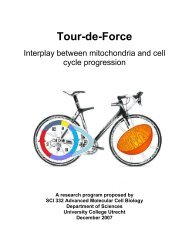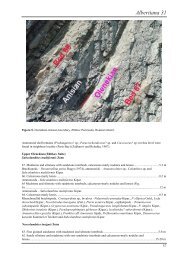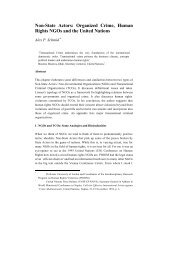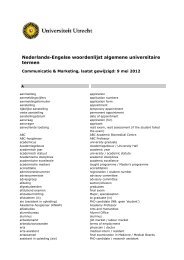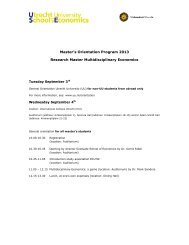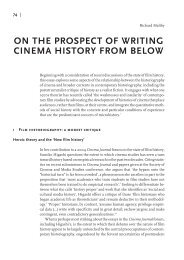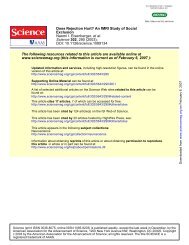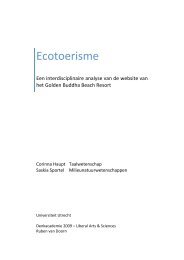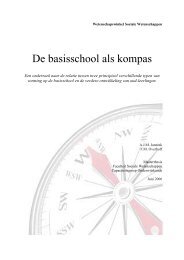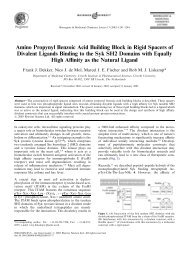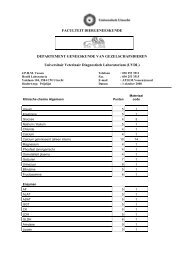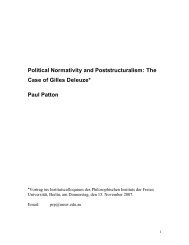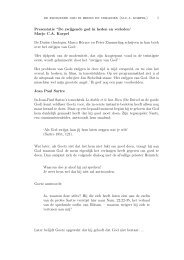Review of the Research Institute for History and - Universiteit Utrecht
Review of the Research Institute for History and - Universiteit Utrecht
Review of the Research Institute for History and - Universiteit Utrecht
Create successful ePaper yourself
Turn your PDF publications into a flip-book with our unique Google optimized e-Paper software.
chronically (Emerging Media) <strong>and</strong> synchronically (Comparative Media) <strong>and</strong> <strong>the</strong> way media shape <strong>and</strong> are<br />
shaped by various historical <strong>and</strong> contemporary publics <strong>and</strong> contexts (Media Cultures). This tradition st<strong>and</strong>s<br />
in sharp contrast to defi nitions <strong>of</strong> media based solely upon a supposition <strong>of</strong> <strong>the</strong>ir technological, semiotic or<br />
aes<strong>the</strong>tic specifi city.<br />
The perspective that has characterized media research in <strong>Utrecht</strong> <strong>for</strong> <strong>the</strong> last decade precludes such a<br />
view, trying instead to map out <strong>the</strong> complex processes shaping <strong>the</strong> emergence <strong>of</strong> a medium. Media take <strong>for</strong>m<br />
within a dynamic fi eld <strong>of</strong> confl icting interests, multiple tensions <strong>and</strong> intense struggles, <strong>and</strong> research within<br />
<strong>the</strong> programme endeavours to address this dynamic ra<strong>the</strong>r than reducing media objects to static texts <strong>and</strong><br />
technologies. Having already acquired an internationally acknowledged position in <strong>the</strong> fi elds <strong>of</strong> early cinema<br />
studies, television history, <strong>and</strong> research on digital media, <strong>and</strong> having generated a number <strong>of</strong> important PhD<br />
projects in this domain, <strong>the</strong> topic <strong>of</strong> “emerging media” will continue to be <strong>of</strong> great interest in <strong>Utrecht</strong> Media<br />
<strong>Research</strong>. <strong>Research</strong> projects include attempts to underst<strong>and</strong> <strong>the</strong> emergence <strong>of</strong> a medium, <strong>for</strong> example, early<br />
cinema, as cultural practice by locating that development against a backdrop <strong>of</strong> competing media <strong>for</strong>ms,<br />
generic precedents, public perceptions, <strong>and</strong> regulatory pressures. And <strong>the</strong>y seek to capture <strong>and</strong> underst<strong>and</strong><br />
<strong>the</strong> logics in<strong>for</strong>ming <strong>the</strong> development <strong>of</strong> <strong>the</strong> latest generation <strong>of</strong> ‘new’ media, both seeking parallels to earlier<br />
development patterns, <strong>and</strong> generating <strong>the</strong>ories that help to account <strong>for</strong> <strong>the</strong> perception <strong>and</strong> use <strong>of</strong> mediumspecifi<br />
c attributes. This particular group <strong>of</strong> scholars was responsible <strong>for</strong> <strong>the</strong> organization <strong>of</strong> <strong>the</strong> international<br />
conference Visible Evidence (2000) en produced several contributions <strong>for</strong> <strong>the</strong> Routledge Encyclopedia <strong>of</strong> Early<br />
Cinema.<br />
The <strong>Utrecht</strong> Media <strong>Research</strong> programme has a special interest in comparative media research. In a<br />
general sense, this concern manifests itself in at least three dimensions: historical comparison; <strong>the</strong>matic comparison;<br />
<strong>and</strong> inter-medial comparison. In fact, much <strong>of</strong> <strong>the</strong> research carried out in this sector combines <strong>the</strong>se<br />
different underst<strong>and</strong>ings <strong>of</strong> comparativity, increasing <strong>the</strong> analytic value <strong>of</strong> <strong>the</strong> ensuing work. These initiatives<br />
share a fundamental concern with media as a constellation <strong>of</strong> practices, as a dispositif, approaching any particular<br />
medium comparatively across media <strong>for</strong>ms <strong>and</strong> contextualizing it both historically <strong>and</strong> environmentally.<br />
Comparative research focuses specifi cally on local <strong>for</strong>ms <strong>of</strong> amusement, in Rotterdam (dr André van der<br />
Velden), <strong>Utrecht</strong> (pr<strong>of</strong>. Bert Hogenkamp) <strong>and</strong> New York (dr Judith Thissen). This innovative local approach<br />
has helped <strong>the</strong> <strong>for</strong>mation <strong>of</strong> international networks in local media history.<br />
The central question in <strong>the</strong> third research area concerns <strong>the</strong> relationship among media, culture <strong>and</strong><br />
society from both historical <strong>and</strong> <strong>the</strong>oretical perspectives. This relationship implies a certain dynamic, a movement<br />
manifest in diverse cultural trans<strong>for</strong>mation processes in which media play a determining role such as<br />
citizenship, cultural identity, new <strong>for</strong>ms <strong>of</strong> (popular) representation, entertainment, <strong>and</strong> cultural participation.<br />
This research area is concerned with <strong>the</strong> particular role <strong>of</strong> media in <strong>the</strong> processes <strong>of</strong> cultural change <strong>and</strong><br />
continuity, in <strong>the</strong> production circumstances <strong>of</strong> media texts <strong>and</strong> <strong>the</strong> texts <strong>the</strong>mselves, in <strong>the</strong> reception <strong>and</strong><br />
appropriation <strong>of</strong> media through its publics, <strong>and</strong> in <strong>the</strong> debate over <strong>the</strong> function <strong>of</strong> media in culture <strong>and</strong><br />
society. Thus, <strong>for</strong> example, one <strong>of</strong> <strong>the</strong> “media cultures” research initiatives considers television in Dutch<br />
society, past <strong>and</strong> present, examining <strong>the</strong> role <strong>of</strong> <strong>the</strong> medium in <strong>the</strong> construction <strong>of</strong> identity. Although media<br />
cultures are important <strong>for</strong> all aspects <strong>of</strong> this group’s research, it is <strong>of</strong> central concern <strong>for</strong> <strong>the</strong> NWO funded<br />
programme Cinema <strong>and</strong> Modern Life, in pr<strong>of</strong>. Sonja de Leeuw’s research on ethnicity <strong>and</strong> cultural identity,<br />
undertaken in <strong>the</strong> context <strong>of</strong> <strong>the</strong> CHICAM-programme (Children in Communication about Migralion),<br />
<strong>and</strong> <strong>for</strong> dr Eggo Müller’s work on new televisual <strong>for</strong>ms in relation to entertainment <strong>and</strong> interactivity, which<br />
has also led to an international workshop on soccer on television, organized in <strong>Utrecht</strong> in 2004.<br />
A 3. Processes in research, internal <strong>and</strong> external collaboration<br />
The group has managed to maintain a dynamic research spirit. Eleven PhD students were recruited during<br />
<strong>the</strong> period under review, including three <strong>for</strong> <strong>the</strong> PhD-international programme which again underlines <strong>the</strong><br />
international outlook <strong>of</strong> this particular group. OGC <strong>and</strong> <strong>the</strong> Faculty Board have also actively stimulated <strong>the</strong><br />
submission <strong>of</strong> grant applications by <strong>the</strong> group, a policy that is now beginning to produce results, with grants<br />
being awarded recently <strong>for</strong> three programmatic projects.<br />
In connection with <strong>the</strong> NWO project “Cinema, Modern Life <strong>and</strong> Cultural Identity in <strong>the</strong> Ne<strong>the</strong>rl<strong>and</strong>s” an<br />
application was awarded by NWO in 2003 <strong>for</strong> <strong>the</strong> creation <strong>of</strong> a fi lmhistorical database, created by scholars<br />
99 The Cultural Construction <strong>of</strong> Media OGC<br />
3



